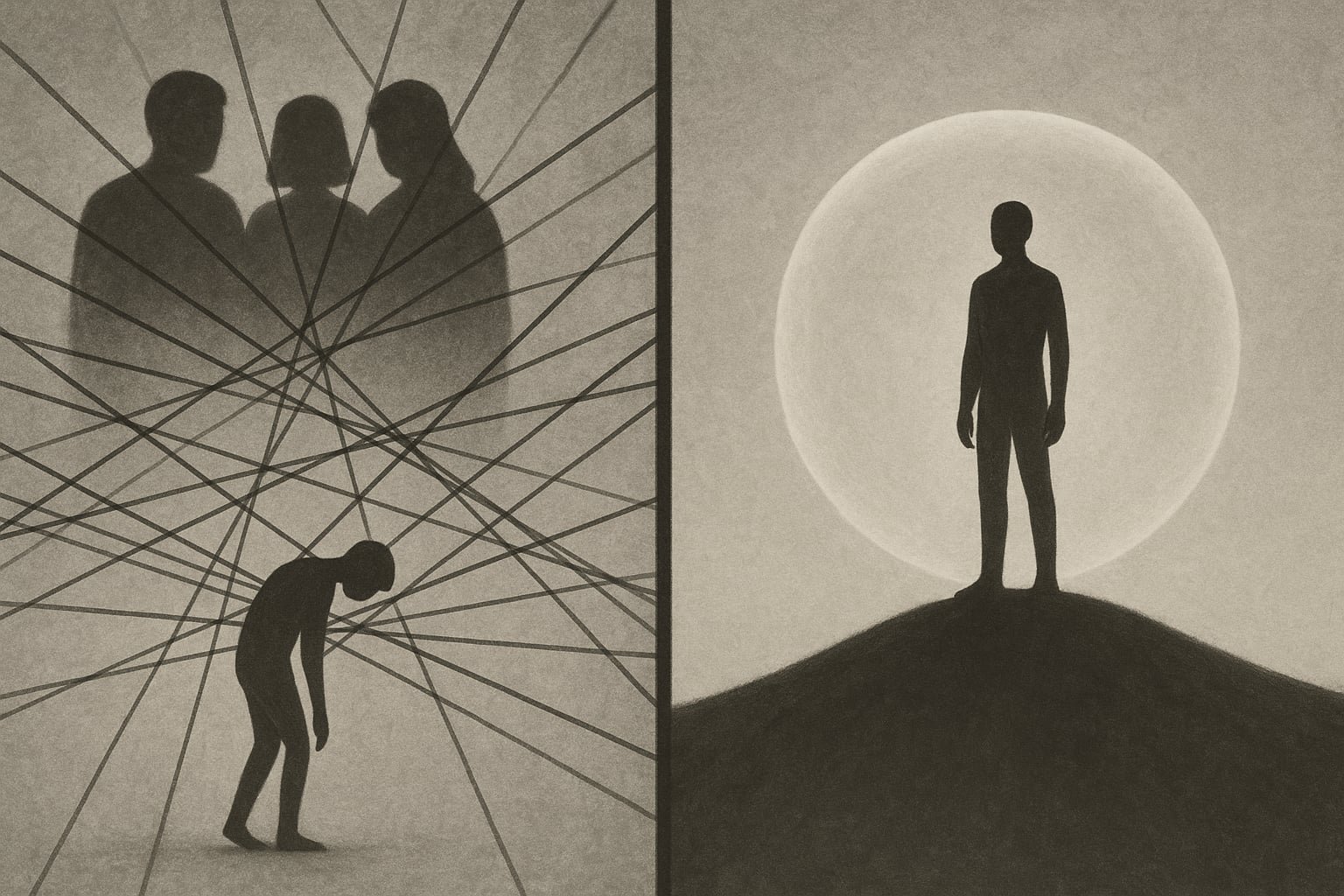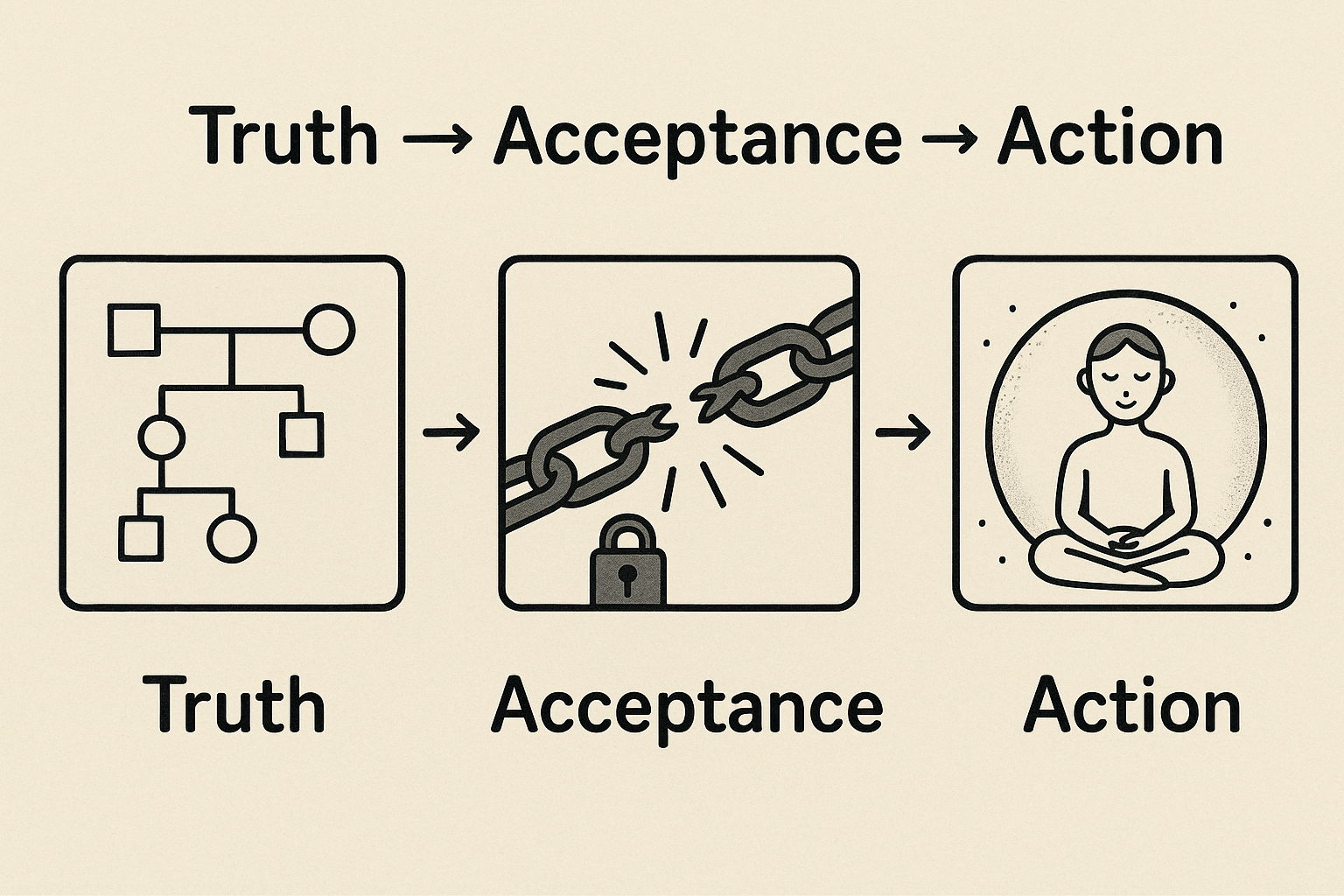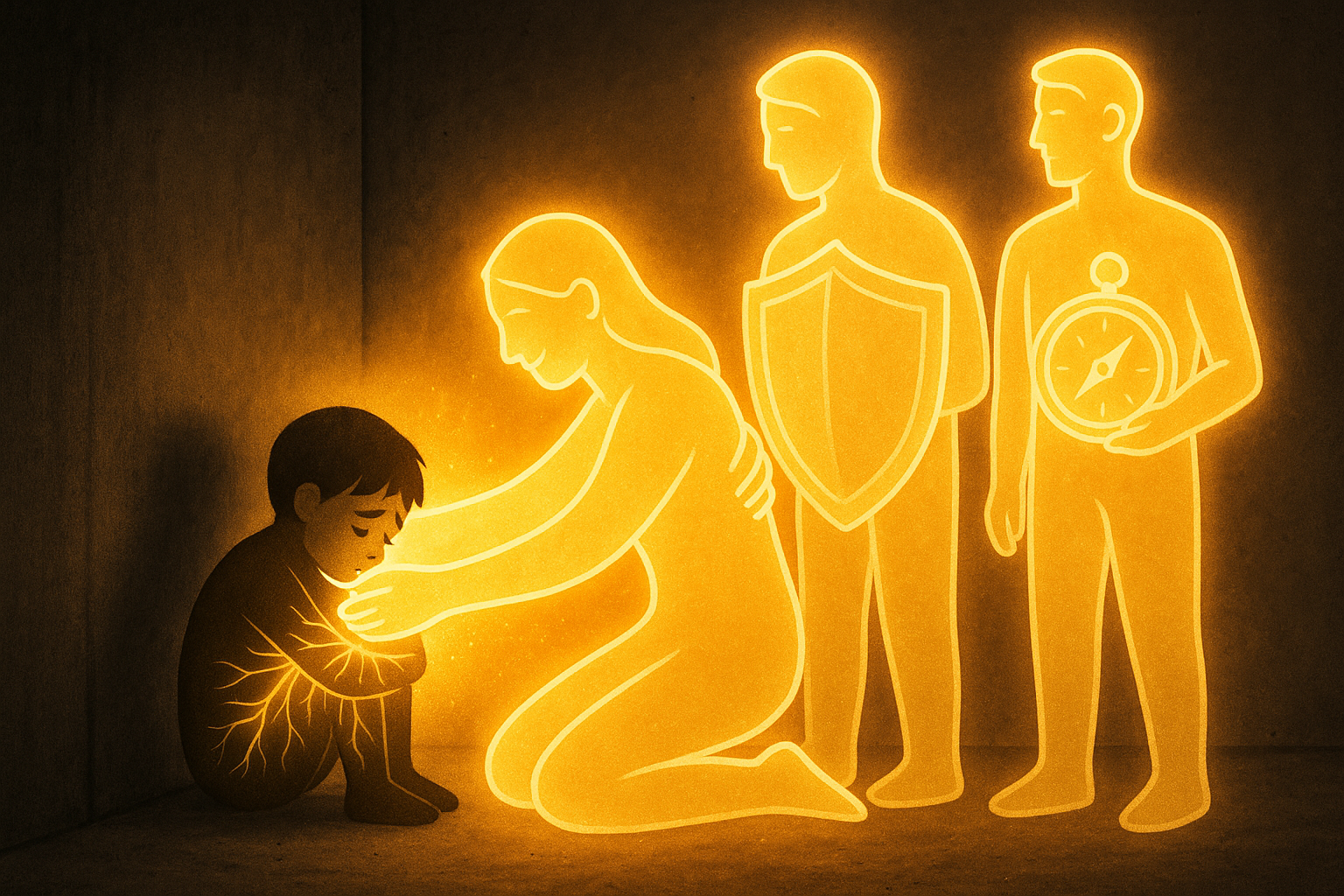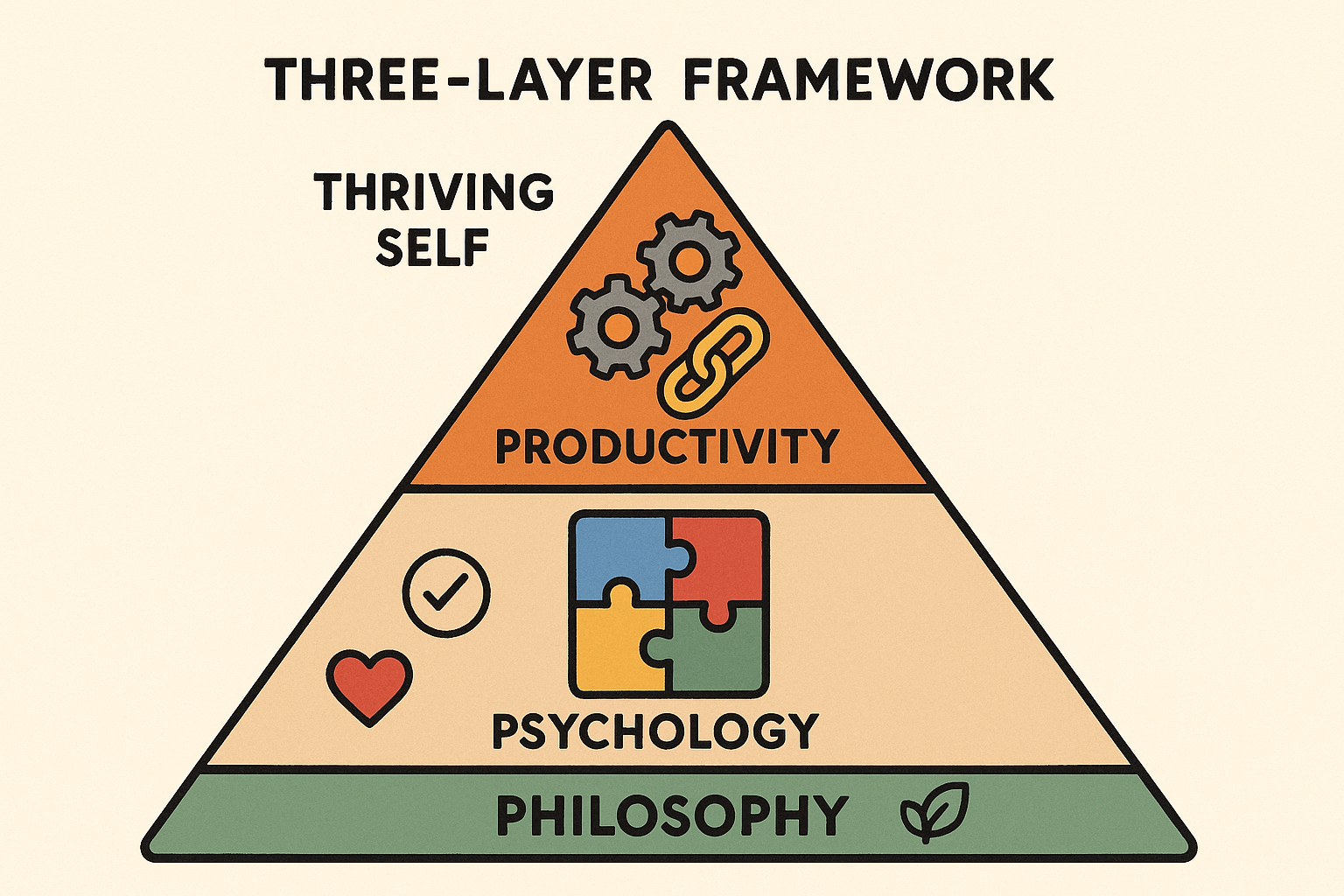The Deeper Wound Beneath the Scapegoat Cycle: Unpacking Narcissistic Abuse in Family Dynamics
Hi folks, this is Blake Anderson, and just like in my YouTube video, I'm diving into what I consider the deeper wound beneath the scapegoat cycle in a family dynamic. Most clients come to therapy naming the surface problems—anxious spirals, people-pleasing, exhausting arguments with a narcissistic parent or partner, or even rumination. Helpful to map, yes, but not the root. Often what's discussed is the surface problem, and what my clients experience are the symptoms versus the root wound. Typically, they're recognizing the symptoms and the surface problems—surface in the sense that they are what shows up in the behavior, and to some degree the thoughts and feelings. At the core of it, it's this root wound that is aggravated particularly within a family dynamic. Beneath every symptom I see in my practice lies a deeper wound: the violated need for safe connection. When the very people meant to be our living, caring home cannot—or will not—meet us, panic erupts. We either merge with the family’s collective ego mass, losing self-hood, or we step out alone, severed from belonging. Neither path is ideal; both ignite the scapegoat cycle.
Why Unsafe Togetherness Hurts More Than Isolation in Narcissistic Family Systems
Anxiety and people-pleasing rumination—these are all things that often are the case in terms of a person who's on the receiving end of being a scapegoat in a narcissistic family. But there's a core issue, and that is that there's a deeper wound, which is the violation and the need for safety and connection is severed. And this, so that the client will either merge with the family ego or has to walk away. And both of these fuel the cycle, regardless. So there's no easy choice when this is what is aggravated. You know, there's a notion of togetherness and differentiation. And so you have your independence as a person, but you're part of a family unit, so there's always a degree of togetherness. However, in a dysfunctional family, this togetherness can be toxic, and there can be the notion of the collective ego of the family served by the kids. Typically there's a rivalry between siblings, but not always, but there tends to be roles assigned, and many people are aware of these dynamics.
In a narcissistic or emotionally immature system, differentiation is forbidden. The family’s unspoken rule reads: “Stay small so I don’t feel threatened.” That's typically a script that was still operating from a very young age. Boundaries blur, blame shifts, shame is weaponized—which I'll get into more. The basic notion is in these families boundaries typically aren't respected, in part and mostly to do with the fact that the parents likely, either one of them, have a lack of boundaries with themselves and the family. This is what happens with narcissism and shame. I think we all have shame, right? There's a notion of toxic shame. So if we make a mistake on something that's natural, I think to feel a level of shame, right? But when we have toxic shame, it's when the family system or the narcissistic parent is weaponizing or using our shame against us in a way that's not appropriate or connected with reality.
Over time the scapegoated child—or the codependent spouse—starts trimming authenticity just to survive. Basically it's what has to happen in these families: this authentic self within the individual has to be trimmed to keep the narcissist's false self intact. So that's basically the pressure. In more severe cases when a family has more malignant narcissism—which is a clinical term—or they just really need to have control and there's no negotiation, it's a bit complex. And it's not to say that there's not nuance in that, but that's typically the trade-off being made between the authentic self and the narcissistic false self. Values, goals, even body cues get muted so the narcissist’s fragile false self can stay intact. It is a slow soul-death, not a life.
You Can’t Un-See the Truth: Facing the Crossroads in Scapegoat Recovery
But this gets me to the point: you can't unsee the truth. So once you see something, you can't unsee it, right? And you can be in denial. If I take an existential philosophy perspective, the notion of bad faith is once you recognize the truth but you still act as though you haven't seen the truth—and there's a bit more nuance to that philosophy. Once you recognize this dynamic, you face a crossroads: either honor what you have witnessed or retreat into denial and “bad faith.” We have to face a crossroad when we're coming to terms with the fact that we are the scapegoat in the family. And I think here of The Matrix, where you have to decide on the red pill or the blue pill—so you can go back to being subjugated and enmeshed in the family dynamic, where you're serving primarily the role within the family, serving the narcissist largely, and your independence or your differentiation is not there or has to be ignored or suppressed.
But that's not to say that you should not have contact with your family or that there aren't ways in which you can still remain differentiated even within a level of toxic dynamics. On average, particularly if it's quite toxic, the best way is to go no-contact or very low contact. Postponing truth only deepens collective anxiety, turning bright souls cynical—or worse, replicating the very traits they fled. Radical acceptance, then, becomes step one of any meaningful recovery journey. But this all starts with radical acceptance as step one to recovery—that's the main point I wanna make.
Differentiation: The Highest Imperative for Breaking Narcissistic Abuse Cycles
And but differentiation, if you truly want to evolve and be happy in your life, is non-negotiable. Healthy development asks: Can I stay connected without betraying myself? The key question here is, can I stay connected without self-betrayal? A lot of my clients—and myself included—try many times to engage them in a way that is appropriate and can resolve the conflict. But if that means that you have to betray yourself and your own development and what might be considered a growth hierarchy—so I got into that in another video where you either accept the dominant hierarchy or the growth hierarchy. In all families, there's a level of hierarchy—the parents are the ones in charge—but there's also the notion of the growth of the family and of each child and family member.
If that's not being served or honored, you have to make a decision to honor your own growth and development, which is unfortunate 'cause it properly means limiting contact or going no contact. But you have to protect your growth hierarchy and bubble else. Sometimes the answer is low-contact, sometimes no-contact; either way, the guiding principle remains the same—protect your growth hierarchy. Tools and strategies (Grey-Rock, Boundary Ladder, IFS parts work) are valuable only if anchored to this decision.
From Diagnosis to Direction: Truth, Acceptance, and Action in Family Trauma Healing
Yes, label the pattern—NPD traits, scapegoat role, trauma bond—but do not camp there. Knowledge must pivot to wise action. So first it starts with truth, then acceptance, and then action. You have to name the system, the facts of the system, so you map the ontology. Ontology is a word from philosophy in terms of the nature of being. And so that's just really like in some business circles or in some businesses—within AI there's the notion of like digital twin. So anyway, not to get too kind of on a tangent, but like something like Palantir or NVIDIA create a digital twin of a business, and so they map the data in terms of understanding how the operations of the business works.
And so you can think about the same with your family in terms of like the being of the family, of the emotional being of the emotional ontology of the family. You have to recognize those facts and name those facts and to your best estimation. And so this is tricky 'cause some of my clients, right, they perhaps had the role of being the scapegoat or the peacekeeper. For many years they have been gaslit, manipulated, or blamed. There can be a lot of inner self-doubt and gaslighting themselves. But by coming and honoring the truth—'cause typically my clients also know the truth.
And so it's again radical acceptance: what will not change. And so this is really understanding the limits of the narcissistic personality disorder, or the traits of this person or family. Then it's acting from a calm place in your nervous system and not being on hyper drive. That sequence—Truth → Acceptance → Action—keeps us from circular rumination and guides us toward strategic engagement or disengagement.
Re-Parenting the Exiled Parts: Healing After Narcissistic Abuse
And part of the journey, I would say, is you have to repair your exiled parts. And so the only way you can do this is by limiting contact at first, which allows your body to quiet. You can then install new parenting roles: the nurturer, the protector, the guide, and rebuild trust in your own signals and needs. When we limit toxic contact, the nervous system finally quiets. Space opens to heal exiled child parts, to install new “parent” functions: nurturer, protector, challenger, guide. We learn to trust body signals again, to build relationships that reciprocate and respect boundaries.
There's a book called Inner Bonding therapy, which I recommend at times to my clients. And or if I just think of Carl Jung, with depth psychology, there's a notion of the archetypes. So these subconscious aspects of our being exist within the collective unconscious. You can think about the fact that we have a father and a mother part in ourselves. If we come from a toxic family and we've radically accepted that they have dysfunction or are unhealthy, then in the book Narcissistic Families she has a term—or they have a term in that book—about the notion of going back to the well.
So if you've been through this cycle many times in your family and you keep going back to the well, but the water in the well is not good for you and it makes you sick, and your body reacts each time, then at a certain point you realize that you can't keep going back to the well. That means accepting the fact of your family and also relying primarily on yourself. And of course you have friends and people that you can rely on for support and maybe a therapist, but you also have to be a parent to yourself largely. I think we all know what intuitively that means—it's that level of self-care and treating that inner part of ourselves, the child part of ourselves, and kind of talking to it as a parent would, watching out for him or her and that kind of thing.
Serving the Whole Without Collapsing Into It: Differentiated Presence in Dysfunctional Families
I would, another recommendation is just understanding serving the whole and not collapsing into the collective ego mass, as I mentioned. And that is honoring the family history without reentering the dysfunction. So you can honor the family lineage and the ancestors, and even your family, but do it from a place of not entering the dysfunction and contributing to it. Which is tricky, right? Differentiation, differentiated presence—so I define that as remaining calm and having strategic engagement. And that can go into coming more from your adult self and being aware of your child part around your family particularly, and how it can lead you to become dysregulated at times.
So if you are growing and you're modeling change in your life, I think that's the imperative of life—that we are here to develop and evolve as humans and in our capacities as individuals. If we are living small and minimizing ourselves or clipping our wings, then we're not living up to our potential. Our conscience will notify us of this. If we've engaged in the cycle so many times and are getting the same result, or we're the ones being blamed, or there's a high level of externalization from the family and projection is coming from others without them taking any ownership or responsibility or self-reflection, we have to honor ourselves again—and that might mean the system doesn't change or mirror our growth, and typically it doesn't in these situations. Honoring family does not mean collapsing into dysfunction. True respect looks like differentiated presence: calmer, more regulated, choosing artful responses over reflexive defenses. In doing so we model a higher order of functioning—something the system may ultimately mirror, or not. Either way, our own development stays intact.
A Three-Layer Framework for Moving Forward: Philosophy, Psychology, and Productivity in Recovery
My approach generally when I work with clients or when I'm framing this in the course that I did on scapegoating is I talk about my philosophy: I believe the individual needs to have a compass, a sense of meaning and values that they can rely on. Also, using psychology principles, understanding depth repair—so this comes from, you know, Carl Jung and just the notion of subconscious and integration. So aspects of ourselves that we might have exiled or have been burdens to us we pushed away—it's owning those parts. This could mean some of the trauma from our past or scripts from a younger age. That's all part of the process too. I also rely on productivity in terms of habits that can turn into daily traction.
So I think, you know, we're all wanting to be successful and happy in our lives and, obviously our trauma or what happened to us is not the entirety of who we are, but if we are reintegrating these parts, working on them, and thinking about how we can stay productive and efficient in our life, then we're moving forward in a much more constructive way and a way that's in line with our growth. In my practice—and in courses like Break the Scapegoat Cycle and Design Your Personal Manifesto—I structure recovery around three interlocking layers:
- Philosophy (meaning & values) → your compass.
- Psychology (depth repair & integration) → your authentic self.
- Productivity (habits & execution) → your engine. Together they transform raw insight into daily traction.
Practical Tools for Narcissistic Abuse Recovery: Gray Rock, Energy Bubble, and More
Just a few reminders of things you can try with your family or just in your own life. Many of us have heard of Gray Rock, so there's a Gray Rock method and that means remaining neutral within the dynamic and giving closer to the facts—not focusing too much on expanding into detail or disclosing too much, but really just being more of a neutral force and an uninteresting force to the narcissist, like a gray rock would be that you don't really notice it. And that's just to protect your inner self and your inner world. And but the thing is I've often remind people is that typically the narcissistic or emotionally immature people or parents aren't, you know, they usually pick up on these things—they might look for reasons to create some level of drama or they will call you out on it. And but I think that there's different methods, but it's definitely a strategy to think about if you are engaging with your family on like a special occasion or you're just seeing them someone on a regular basis.
And I also, in my course on scapegoating, I talk about an energy bubble, or you can consider it like a protective aura that these are just the notion of subtle energy. And when you're in the space of your family, if you can have the sense of having this boundary that's a safety within yourself, that's another way to think about it. You can think about things kind of bouncing off you. Or if a comment is made, then it doesn't penetrate this aura you have.
Okay. And there's also the notion of boundary ladder. Basically you're going to be engaging the family or your parents to the degree in which you are comfortable and feel safe. If there's a violation of your boundary and you've explained it to 'em in a calm and rational manner, then you take a step back and lower your level of contact until you can calm yourself down—also perhaps have them have some form of acknowledgement. But typically there's an aspect where they're not acknowledging it and you go back to the cycle. But it's just something to think about: just engaging your level of contact based off of your safety and also your growth. And just kinda what's working for you both within your body and your mind. And you could map the role self and the true self—that's also another tool I offer in that PDF worksheet that I provide, that the toolkit.
Blake Anderson, MSW, RSW helps high-functioning adults break the scapegoat cycle, reclaim self-trust, and design purpose-driven lives. Explore free worksheets and the full Scapegoat Recovery Course (which includes the Design Your Personal Manifesto Course) to deepen your healing—learn more here. To stay connected with weekly insights on narcissistic abuse recovery, family systems tools, and purpose-driven productivity, sign up for my newsletter below—no spam, just genuine support for your growth.
What are your experiences with the scapegoat role or these family dynamics? Share in the comments—I'd love to hear and engage. Please like, subscribe to my YouTube for more, and have a great day.





